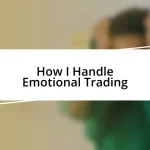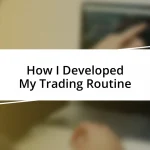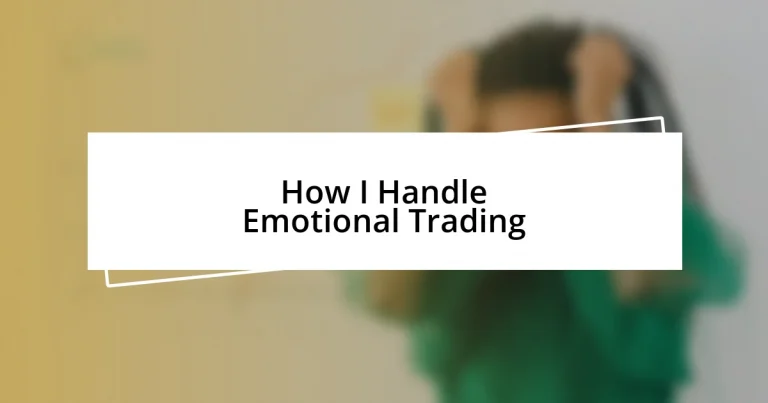Key takeaways:
- Emotional trading can lead to impulsive decisions driven by fear, euphoria, greed, frustration, or FOMO; recognizing these triggers is essential for maintaining control.
- Implementing strategies like mindfulness meditation, keeping a trading journal, and using emotional checklists can help manage emotions and improve trading outcomes.
- Seeking support from trading peers and mentors fosters accountability, helps process emotional challenges, and reinforces a positive trading mindset.
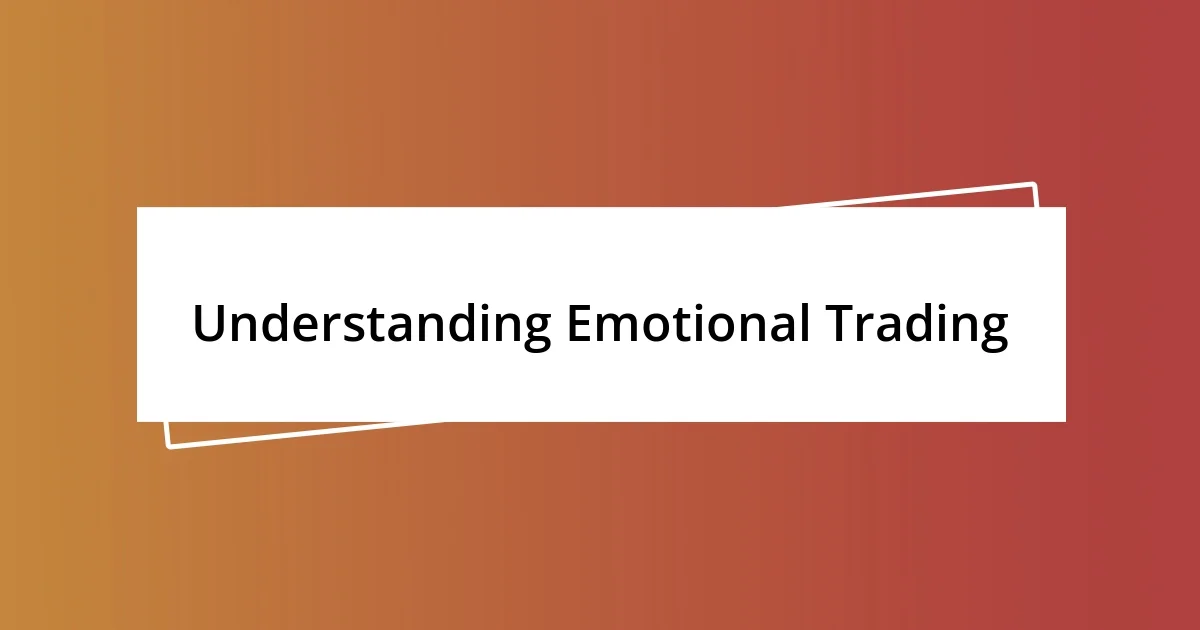
Understanding Emotional Trading
Emotional trading is a phenomenon that many of us encounter in our investment journeys. I remember a time when I let fear guide my decisions, selling stocks during a downturn out of sheer panic. Have you ever experienced that sinking feeling when the market dips, making you question all your strategies?
The struggle to separate emotions from trading decisions can be overwhelming. I’ve found that moments of frustration often stem from unrealistic expectations. It’s natural to feel excited when a trade goes well, but how do we handle that exhilaration when the tides turn against us? Acknowledging these emotions is the first step toward managing them.
Understanding emotional trading means recognizing the impact of our feelings on our financial choices. I often ask myself: Are my decisions driven by analysis or by a response to recent events? This reflection helps ground my trading strategy, steering me away from impulsive actions born from emotional highs and lows. After all, the most successful traders I know maintain a calm and collected mindset, even in uncertain times.
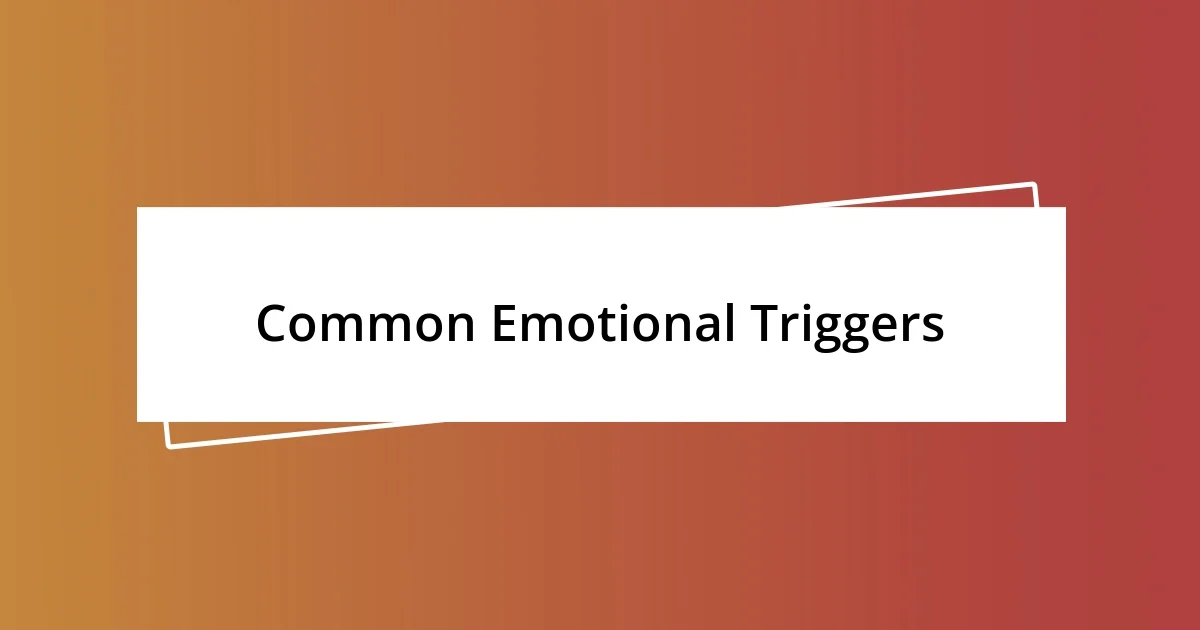
Common Emotional Triggers
It’s fascinating how easily emotions can creep into our trading strategies. I’ve experienced firsthand how specific events can trigger irrational decisions. For instance, when I see a stock I’ve invested in plummet, I can feel that rush of anxiety amp up—like it’s not just money at stake but my entire confidence as an investor. That’s when I remind myself to step back and identify the root cause of my emotional reaction.
Common emotional triggers that I’ve encountered include:
- Fear of Loss: The panic when I think I might lose my investment.
- Euphoria: The overwhelming joy after a successful trade, which can blind me to the risks.
- Greed: The temptation to hold onto a winning stock too long, hoping it’ll climb higher.
- Frustration: The anger that arises from missed opportunities or unexpected market dips.
- FOMO (Fear of Missing Out): The pressure to jump into trades just because others are making profits.
Recognizing these triggers has been crucial in my journey. Whenever I find myself reacting strongly, I take a moment to analyze whether my feelings are dictating my actions. This pause is vital—it’s about regaining control and ensuring each trade reflects my well-thought-out strategy rather than a sudden emotional surge.
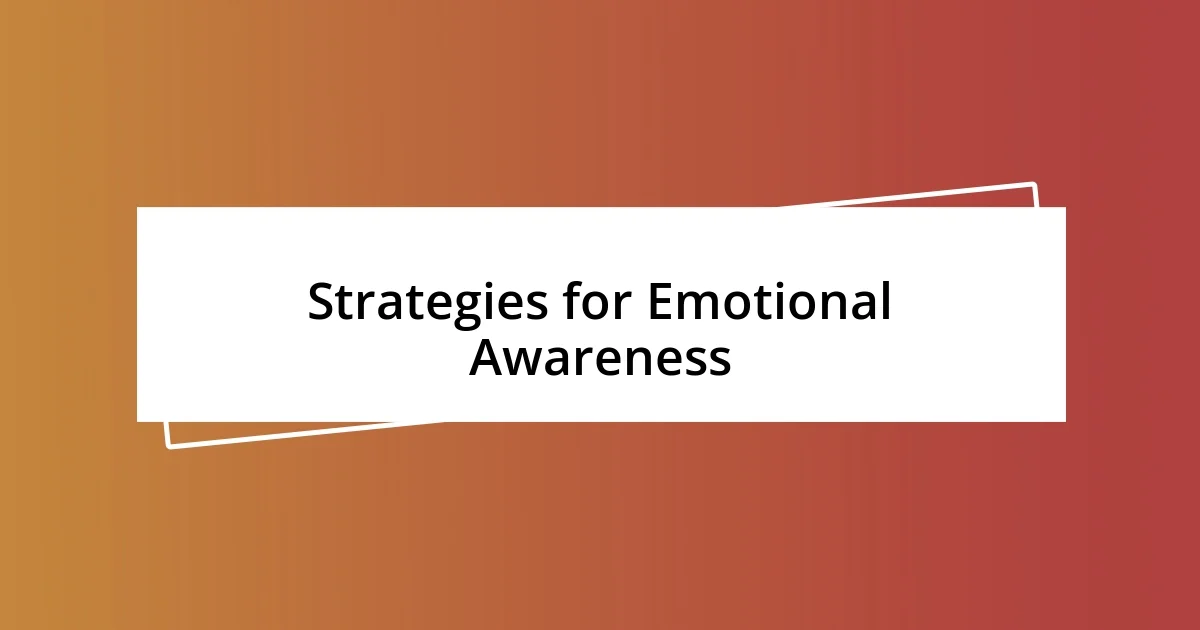
Strategies for Emotional Awareness
When it comes to emotional awareness in trading, I’ve learned that grounding techniques can be incredibly effective. One practice I often employ is mindfulness meditation. By taking just a few minutes to focus on my breathing, I can clear my mind and better recognize any emotional turmoil brewing beneath the surface. It’s like switching on a light in a dark room; suddenly, I can see the shadows and address what’s bothering me before it spirals out of control. Another strategy I find valuable is keeping a trading journal. Reflecting on past trades helps me identify patterns in my emotional responses, making it easier to manage them in the future.
I also think it’s crucial to develop a personal emotional checklist. For instance, before executing a trade, I ask myself: How do I feel right now? Have I considered my emotional state? This simple act of self-checking can prevent rash decisions fueled by anxiety or excitement. Once, during a particularly volatile market period, I relied on this checklist. By recognizing I was feeling anxious, I chose to take a break instead of executing a trade impulsively. That moment of pause made all the difference, keeping me from a potentially costly mistake.
Moreover, sharing my experiences with fellow traders has proven to be beneficial. Talking candidly about emotional challenges with a trusted trading partner allows for a richer understanding of our feelings. Just the other day, I connected with a friend who shared his story of holding onto a losing stock out of fear. Hearing his experience reminded me that I’m not alone in this journey and reinforced the importance of emotional awareness. It’s all about building a supportive environment that nurtures self-reflection and growth.
| Strategy | Description |
|---|---|
| Mindfulness Meditation | A technique to clear the mind, recognizing emotional turmoil before it leads to rash decisions. |
| Trading Journal | A record of past trades highlighting emotional responses and helping to identify patterns. |
| Emotional Checklist | A self-checking method to assess emotional states before making any trades. |
| Peer Support | Discussing emotional challenges with fellow traders for mutual understanding and growth. |
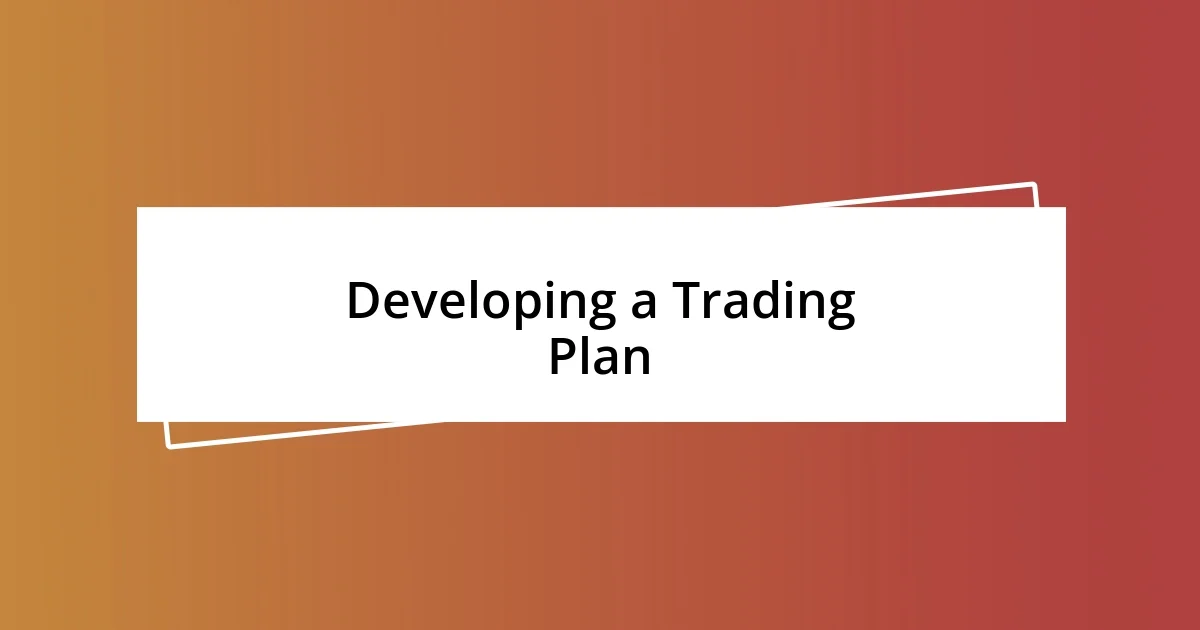
Developing a Trading Plan
Creating a solid trading plan is something I’ve come to view as my lifeline amidst market chaos. Having a well-defined strategy allows me to navigate emotional turbulence with greater ease. I remember a time when I had a clear plan outlining my entry and exit points, even amid mounting pressure from market fluctuations. That plan kept me grounded.
When I develop my trading plan, I make sure to include specific goals and parameters that resonate with my personal trading style. I often ask myself, “What am I willing to risk, and what is my target profit?” This kind of clarity not only reduces anxiety but also cultivates a sense of confidence. There was a moments when I neglected this aspect, leading to impulsive trades that only fueled my emotional rollercoaster.
In reviewing my plan regularly, I can adapt to changing market conditions while remaining committed to my long-term vision. I find it vital to periodically check if my strategy aligns with my emotional state. For instance, if I’m feeling overly optimistic after a winning streak, I reassess my risk management tactics to rein in any potential recklessness. Each time I do this, I reinforce the idea that a well-thought-out plan isn’t just about numbers—it’s my emotional safeguard.
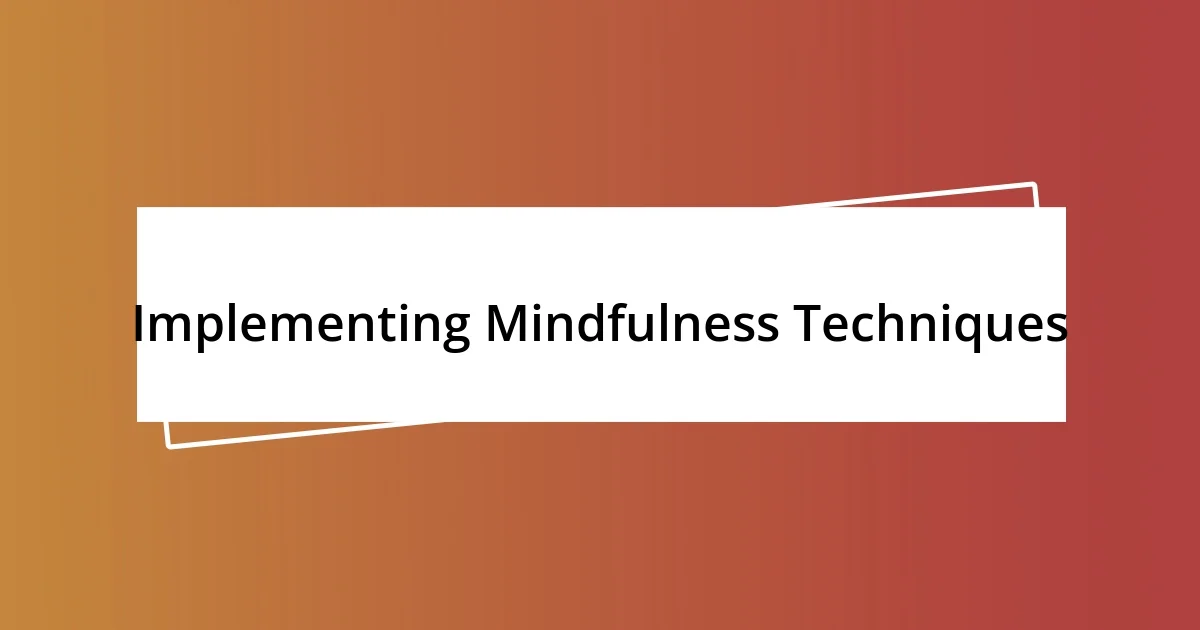
Implementing Mindfulness Techniques
Implementing mindfulness techniques has genuinely transformed my approach to trading. I try to carve out a few moments during my day to practice mindfulness meditation. It’s incredible how that simple act of focusing on my breath helps me detach from my busy thoughts. One day, after a particularly stressful trading experience, I sat down for a five-minute session. By the time I finished, I felt lighter, and my ability to think clearly about my next steps dramatically improved.
Another technique I find useful is mindful observation, where I consciously acknowledge my emotional responses while trading. I remember a heated moment when I was on the verge of making a decision based purely on frustration. Instead, I paused and asked myself, “What am I really feeling right now, and why?” This simple inquiry led me to realize that my frustration stemmed from a series of losses. By naming the emotion, I could step back and decide rationally rather than act impulsively.
I’ve also started incorporating mindful break intervals throughout my trading day. Setting a timer to remind myself to pause for a moment has made a huge difference. During these breaks, I reflect on my state of mind, which prevents me from carrying emotional baggage into my next trade. I recall a specific afternoon when a quick stroll helped me transition from a stressed mindset to one of focus and clarity. Isn’t it amazing how a moment of stillness can bring back our center? Embracing these mindfulness practices has not only improved my trading results but also enhanced my overall well-being.

Using Journals for Reflection
Using a journal for reflection has become an indispensable part of my trading routine. Each evening, I take the time to jot down my thoughts, feelings, and outcomes from the day. It’s almost like having a heart-to-heart with myself. One night, after reflecting on a particularly challenging trading session, I realized that I was often letting my wins inflate my ego and my losses crush my spirit. Writing about these highs and lows allowed me to see patterns in my emotional response that I hadn’t noticed before.
I often include questions in my journal entries to challenge my thinking. For example, I’ll ask myself, “What triggered my emotional reactions today?” This simple inquiry leads to surprising insights. I discovered, after a few weeks of journaling regularly, that many of my impulsive trades were tied to external stresses, not just market movements. By identifying and understanding these triggers, I can better equip myself to handle similar situations in the future.
Sometimes, I revisit past entries to track my emotional growth. I remember going through a phase where anxiety ruled my trading decisions. As I flipped through pages of my journal, I could pinpoint those tumultuous weeks and compare them to my current state of mind. The growth was palpable, reminding me that the journey is ongoing. This practice doesn’t just help me process emotions; it also reinforces the idea that every experience, good or bad, is a stepping stone towards becoming a better trader. Have you ever done something similar? Journaling, for me, is not just about recording facts—it’s about understanding the emotional journey that accompanies those facts.
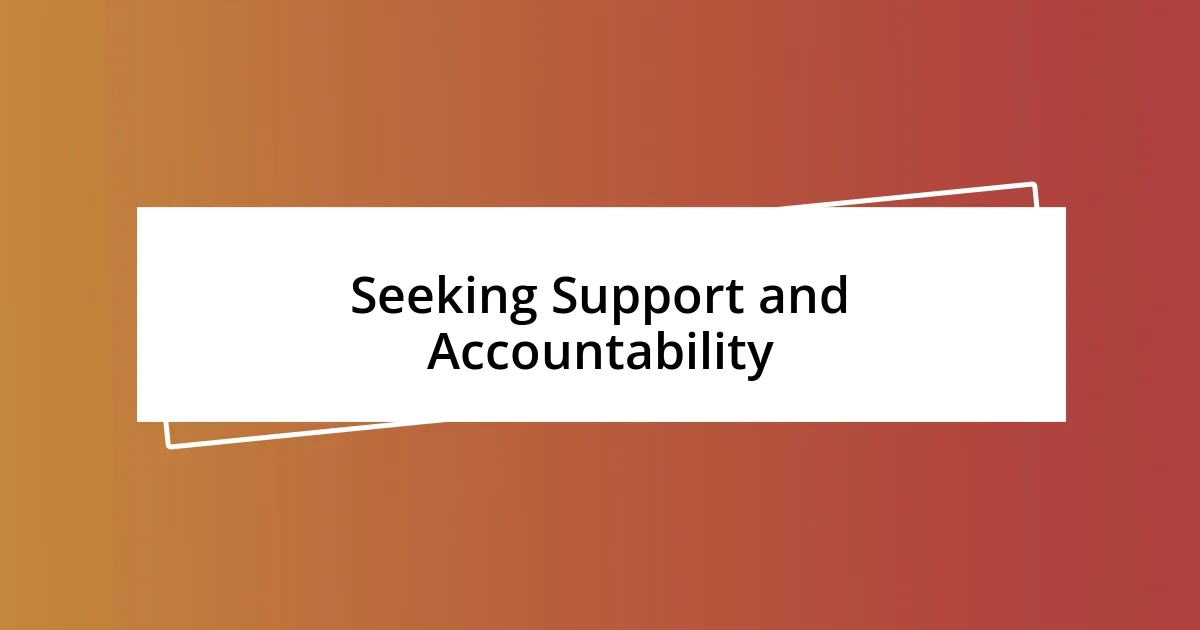
Seeking Support and Accountability
Finding support and accountability in trading can truly shift the entire game. I’ve been part of a trading group for a while now, and it’s been eye-opening. During one particularly tumultuous market phase, I reached out to a fellow trader when I found myself spiraling. We openly discussed our emotional responses, and that conversation helped ground me. Have you ever sought advice during a rough patch? Sometimes, just knowing someone else understands can lighten the load.
I also believe that accountability partners can keep us honest. I remember setting up a goal with a friend—only to place trades that aligned with our strategies and emotions. This simple commitment created a sense of responsibility. When I was tempted to chase a trade out of impatience, I could think, “What would my accountability partner say?” It’s a gentle nudge back to reality, reminding me of my broader goals.
Moreover, I’ve found that regular check-ins with a mentor can provide invaluable perspectives. In one session, I was struggling with feelings of inadequacy after a few bad trades, but my mentor reminded me that every trader faces setbacks. He shared his own stories of failure, which helped me to reframe my challenges. How vital is it, then, to connect with others who have walked this path? Sharing experiences not only fosters camaraderie but also builds resilience, making emotional trading more manageable.
